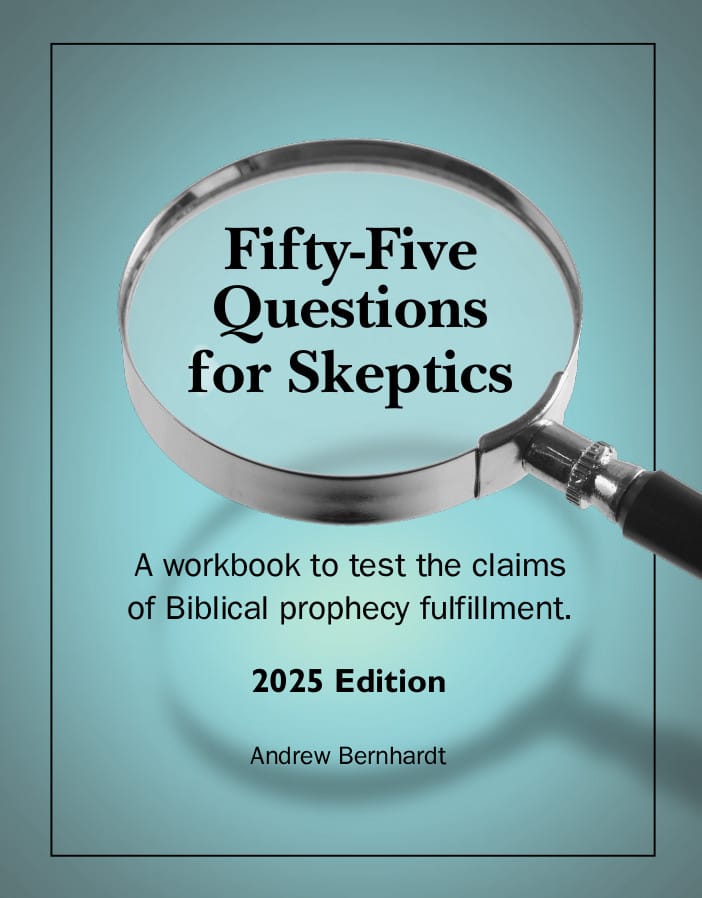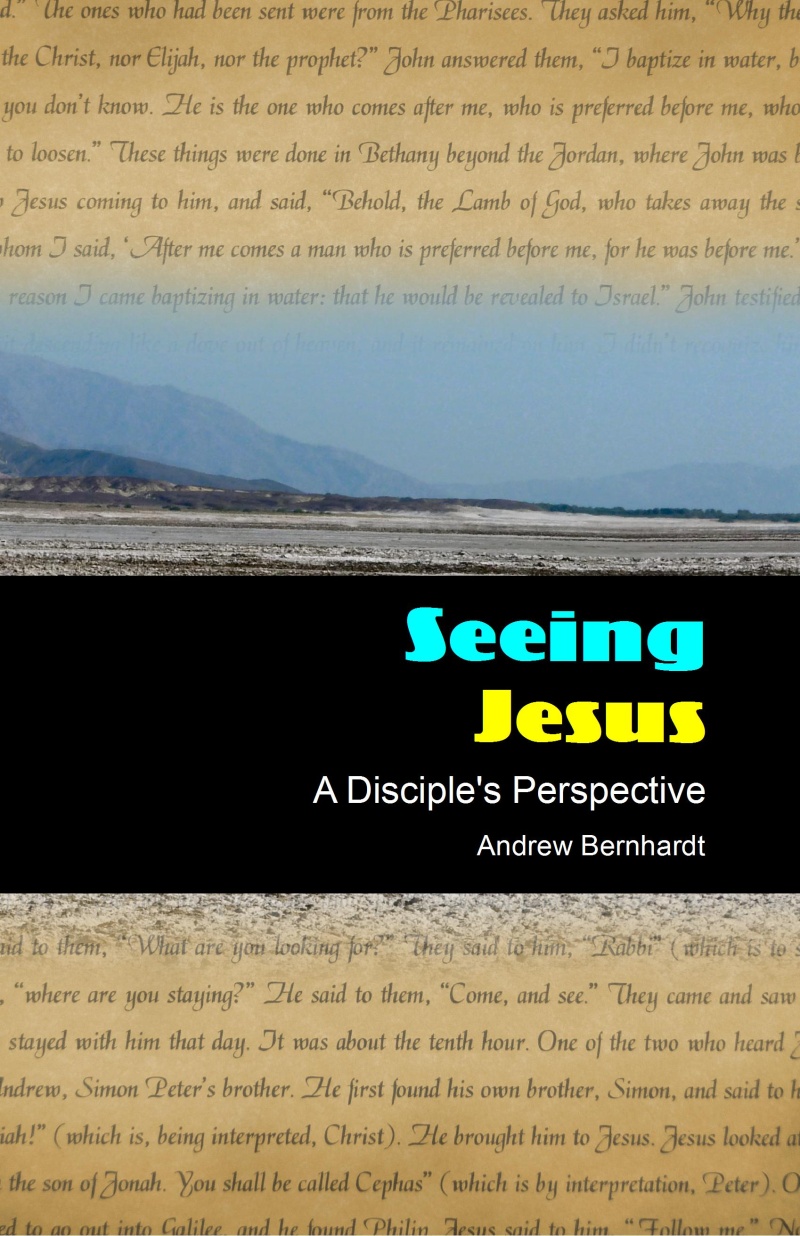 Fifty-five Questions for Skeptics
Fifty-five Questions for Skeptics
Years ago, as I was building my apologetics library, I bought a short book by Bill Cetnar called Questions for Jehovah Witnesses. It contains photocopies of pages from official Watchtower publications, with questions for the Jehovah Witness to answer. If you’ve ever had a visit from these people, you know you can’t teach them anything from the Bible. They just won’t listen. They’ll only accept what their organization teaches. But they do like to answer questions. For this reason, the approach used in the book works very well.
I find atheists are much like Jehovah Witnesses: you can’t teach them anything from the Bible. But a few are willing to investigate the evidence. So I wanted to put together a short book using the same approach to reach atheists to show them the evidence for God and the inspiration of the Bible.
Other apologetics books rely on pushing doctrine, intellectual arguments, philosophy, and expert testimony (“Mr. Famous Theologian says…“). The research is done for the reader. But most skeptics won’t trust information fed to them because that’s what they are: skeptics. I didn’t want my book to be like that, so here’s the criteria I used:
- Knowing that the atheist is skeptical of Christian claims, I wanted the book to rely only on hard evidence, with no claims from second- or third-hand testimony. Only evidence publicly acknowledged by the secular world and investigatable by the reader first-hand would be accepted.
- Like Cetnar’s book, I wanted my book to consist of questions for the atheist to answer. The questions would be straightforward and simple. There would be no bias in their wording that would favor a particular answer.
- I wanted to pick an area of evidence that the reader is a witness of, so I chose the biblical prophecies of the restoration of Israel in the latter days. Everyone knows Israel exists as a nation today …and if anyone doesn’t, he can easily find it out. But few are aware that the Bible foretold Israel would be restored, and it described what things would be like in that restored nation. All the reader needs to do is read the biblical prophecies for himself and compare what they say to the way things are today. I picked this area of prophecy because it stands up strongly to all of the skeptic’s objections to fulfilled prophecy. These objections are:
- “The prophecies were written after the events happened.” – Israel was restored to her homeland in 1948, thousands of years after the prophecies were written. The reader can still find and purchase Bibles that are much older than modern Israel.
- “The prophecies were written vaguely. They can be interpreted to mean anything.” – The skeptic would be invited to read and interpret the prophecies for himself without any outside help because their meanings are obvious and self-explanatory.
- “The fulfillments were coincidental, the result of random chance.” – Enough questions would be asked so the reader can literally calculate the mathematical probability of the fulfillments to prove they were not fulfilled by random chance.
- “The prophecies were purposely fulfilled to make the Bible seem true.” – Many of the fulfillments have been accomplished through non-believers – even enemies of the Jews. Also, if all it takes to fulfill prophecy is a desire to fulfill prophecy, we would see many more non-biblical prophecy fulfillments.
- “The Bible writers lied about the fulfillments.” – The Bible writers never claimed fulfillment of these prophecies because it didn’t happen in their time—it happened in our time.
- In the book I won’t quote scripture or provide any commentary to try to bias the reader. Only scripture references for the prophecies would be provided so the reader can read and interpret them for himself. No information is to be fed to the reader that he may not trust. I believe the Bible will speak for itself without help from me. And first-hand investigation of truth leads to a much stronger conviction of the truth than trying to indoctrinate someone.
- The reader would do his own research, only using sources of information he trusts. But only hard, real-world evidence would be allowed. No theories are to be accepted unless there is strong evidence for them. The reader is free to come to his own conclusions (whatever that may be), as long as it is backed up with evidence. The facts must speak for themselves.
- The book must be suitable for the individual or a group, and it must work whether the reader sincerely wants to know the truth, or wants to disprove it.
The result is Fifty-Five Questions for Skeptics, a short workbook written for the atheist who is willing to do his own research. It won’t appeal to everyone. It’s targeted to a specific kind of unbeliever that is not reachable through other means. This is my way of gleaning that corner of the atheist mission field.
There is plenty of evidence that God exists and the Bible is inspired of God. People see the evidence and don’t realize it. Finding an atheist who is willing to research that evidence is surprisingly rare because, while atheists say they want proof, most refuse to examine the evidence. I posted about this workbook in another Facebook apologetics group that was taken over by atheists, and from the objections they presented, it was obvious they didn’t even try to do any research. Reasoning with them is like trying to reason with a flat-earther. But there are a few who are willing to do honest study.
The 2025 edition contains a new appendix showing how AI chatbot GROK answers the first eleven questions (which are difficult to research otherwise).
I believe anyone who goes through this workbook and earnestly seeks the answers to the questions will come to the conclusion that God exists and the Bible is completely reliable and inspired of God. The gospel will then have better ground to be sown in. From there, I encourage the reader to continue studying the Bible, and especially the claims of Jesus Christ.
The book is available as a free download at: https://dtjsoft.com/other/55questions.pdf. It is also available for free from Google Play. Printed copies are also available on Amazon.com ($9.99). (The old version without the GROK answers can be download here.)
 How to Gain Victory Over Sin
How to Gain Victory Over Sin
The most dangerous enemy the Christian has to fight is not Satan or the world, but the sinful desires of his own fleshly nature. Peter said these desires war against our souls. This is a book for the Christian who is tired of losing battles in his personal war with sin. He echoes the apostle Paul’s cry for help: “What a wretched man I am! Who will deliver me out of the body of this death?”
In his letter to the believers at Rome, Paul described his own battles with sin—battles he repeatedly lost in spite of his best efforts. He had to learn victory cannot come through will-power. If we’re honest with ourselves, we will admit the same thing. But then God showed Paul the only way to overcome sin: through the power of the Holy Spirit.
Discover what the Bible says about the root cause of our practical sin problem and the role the Holy Spirit has in dealing with it. Then, join Paul when he exclaims, “I thank God through Jesus Christ, our Lord!”
This book is available in paperback and for Kindle from Amazon.com, or by special order through your local book store. It is also available as an e-book through Google Play and Smashwords. After you’ve finished reading, please consider leaving a short review on Amazon, Smashwords, or Google Play.
Download the free complete PDF version here!
Listen to the audio version here! (Contains the main part of the first edition of the book.)
 Seeing Jesus – A Disciple’s Perspective
Seeing Jesus – A Disciple’s Perspective
This is a book to reconnect Christians to their Master. If you’ve gotten caught up in Christianity without Christ, if your relationship with Jesus is one in name or theory only, then this book will help you see and know Him in a new way. It will encourage you to keep looking, listening, and especially following Him on your own. ‘Seeing Jesus’ is a short, easy read, with a strong discipleship focus. It is written in four parts, each of which can be read by itself.
This book is available through the following links (as well as special order through your local book store):
amazon.com (paperback)
amazon.com (Kindle)
smashwords.com (Other e-readers: Nook, iPhone, Sony, etc.)
Download the free preview: PDF
For more information, check out the F.A.Q..




Comments
Andrew Bernhardt’s Books — No Comments
HTML tags allowed in your comment: <a href="" title=""> <abbr title=""> <acronym title=""> <b> <blockquote cite=""> <cite> <code> <del datetime=""> <em> <i> <q cite=""> <s> <strike> <strong>